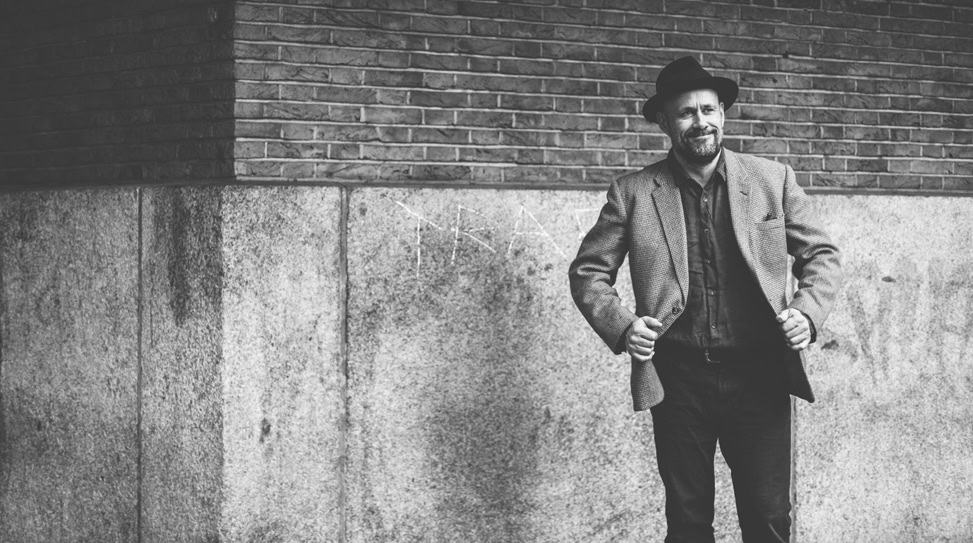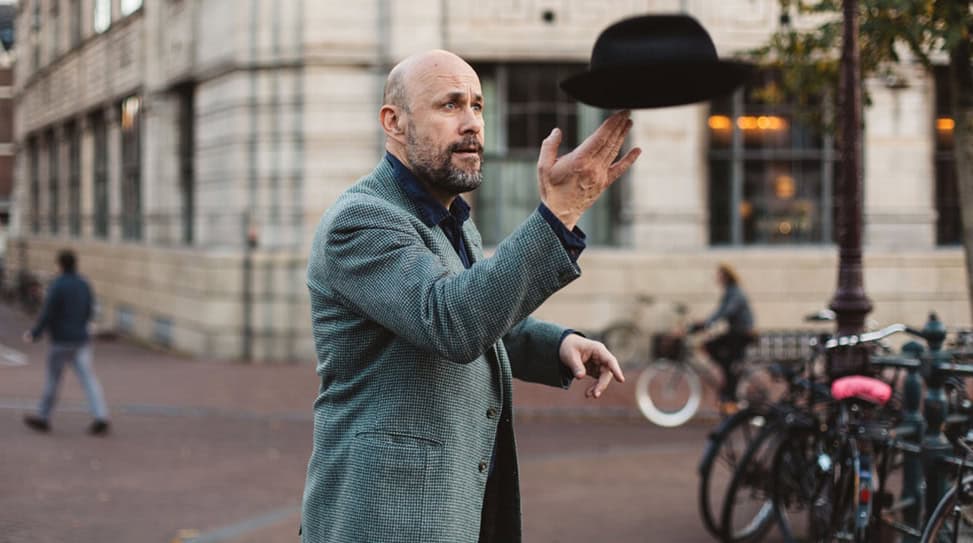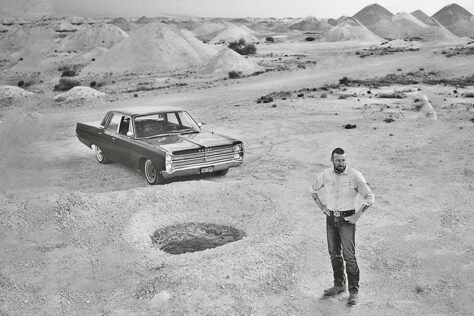I hope that people will watch the film and feel that it’s absurd to call her a terrorist. That is my hope.
We all know that the environment is fucked, but how much do we as individuals fight to curb its impending derailment? The central figure at the heart of actor-turned-filmmaker Benedikt Erlingsson’s Woman at War does more than her share. This earth mother is simply a badass.
When we first meet Halla (Halldóra Geirharðsdóttir), she’s dexterously using a bow and arrow to short-circuit a rural power line, causing a blackout that temporarily shuts down a nearby aluminum factory. Pursued by the police all the way to her picturesque home in Iceland’s Reykjavik, Halla quickly slips back into her surface routine as a mild-mannered, fortysomething choir director, riding around on her bicycle, practicing tai chi, and adorning her walls with portraits of Ghandi and Mandela. We’re to believe that the covert eco-superhero has been running a one-woman resistance against the encroaching aluminum industry for some time now. For the Icelandic authorities—wary that a deal with China might go south if the sabotage of electricity pylons continues—Halla is nothing more than a terrorist. Complicating things further is a letter that arrives in the mail, informing Halla that her application to adopt a Ukrainian orphan girl—made some years ago and all but forgotten—is going through. Now her personal versus political dilemma is set in motion.
Woman at War marks Erlingsson’s sophomore narrative feature, which premiered last year in the Critics’ Week sidebar at the Cannes Film Festival. It’s his follow-up to Of Horses and Men, for which he picked up the Best New Director prize at the San Sebastián Film Festival in 2013.
Woman at War opens in select theaters on March 1st.
Woman at War brings to the fore an important question, especially in the context of our topsy-turvy world: how far is too far and how much is not enough when you take matters into your own hands to “stop the crimes against us,” as Halla says in the film? Can Hallas exist in the real world, and how would she be received and perceived by us?
It’s all about the narrative, of course. Maybe she could get us to follow her narrative. Maybe it could come true, or maybe not. Maybe the spin doctors would make her into a terrorist like in the film. It’s very strange. It’s very interesting how often environmental activists are labeled as enemies of the state in many countries and dealt with accordingly, and yet, they’re fighting for a common interest. This is a perspective that we have to change. Maybe one day the polluters will be on the run and we’ll be the ones chasing them with high technology. [Laughs] I think we have to turn the tables. I think environmentalists have to become a united force that is to be reckoned with. We have to take higher standards and press ourselves against the negotiation table—well, climate change is doing it for us. We have to be dangerous. We have to take space.
Some critics have called Halla a terrorist as well and you’ve always pushed against that idea. Her manifesto is to save the world. She’s not harming anyone. Halla’s more objectively other things: a master of sabotage and an eco-activist. Did it surprise you that viewers would call her a terrorist?
Yes, yes, yes! Terrorists act against innocent people—kill people. They want submission and surrender by creating terror. That’s of course not her method. But it’s easy to label it as such. It’s a confusion about the word “terrorist.” It’s all in the language and in what manner you’re using it. It has to change. I hope that people will watch the film and feel that it’s absurd to call her a terrorist. That is my hope.
You once identified as an environmental activist yourself. At 18, you chained yourself to a boat in protest of whale hunting in Iceland. Do you still identify as an eco-activist? The film is a protest—a different kind of protest—and maybe a more effective one in terms of reach.
Yes, I think you’re right. If I’m an activist in some area, it’s in this area. In 2006, 2007 and 2008, I was on the road to becoming a very radical Halla, but at the same time, I had twins. I was suddenly with two small newborns, and there was an economical crisis in Iceland. I had to postpone my career as a surpasser. [Laughs] Then I thought it was safer to just make a film about it.
This is a personal story.
It is a personal story. I’m also thinking in terms of reality. If you cross the line, you will strengthen your enemy—you will unite the enemy and you will become an enemy of the state.
I couldn’t help but notice how often you get asked about the decision to make your protagonist a woman. What does that tell us about the person asking the question? It’s perplexing.
It comes from the culture! They don’t ask too much about it in Scandinavia and Iceland—that’s not even a question. I sometimes feel like I must come from a country of the Amazons when they ask why I chose to make this hero a woman. [Laughs] The answer is that it just comes with the story. It’s not a question of gender. And why not?
You have a sharp sense of humor. I especially like the portraits of Ghandi and Mandela hanging in Halla’s home as a sort of alter. There are obvious parallels in their protests. I wondered if it’s also a commentary on celebrity worship, like how teens hang posters of idols on their bedroom walls.
Of course. It’s a strange mix. Also, heroes like Halla—we can laugh at her a little bit. We can laugh at each other and at ourselves. These heroes are iconized. They could be posters in teenagers’ bedrooms.
You’ve made an entirely accessible film about complex issues. Woman at War is not a full-on comedy of course, but there’s an assertive comic bent to it. I don’t know that this film would really work had it been completely serious without it being a documentary. Is the right dose of humor something to be conscious of while you’re writing a script like this or is your pen-to-paper process less fussy than that?
It’s really what makes my heart tick. It’s just my style of storytelling. I have to entertain myself. This is also an action film about a hero saving the world, and to do a film like that, I maybe need a little help from humor. In a way, it’s a fairytale. I really think it comes from an older storytelling culture. To tell these stories, you have to also tell some jokes. I love storytellers who smile to us, even in moments of drama. It comes back to the clown in the theater. Even the most heartbreaking, dramatic moments I experienced in theater come from the clown. After making us laugh, he goes to the heart. When I say clown, I’m not talking about the McDonald’s clown. I’m often misunderstood. I’m talking about the comedian—the comic element. The clown is very close to the heart of a child. He only tells the truth.
You made a bold decision to incorporate the musicians and the choir providing the film’s soundtrack into Halla’s reality. We see them at various stages of the narrative in the actual landscape. This is an agreement that you make with the audience early on—that you will break the fourth wall. Was there ever a worry that viewers might not go on that ride with you?
Well, it’s a very old device and I’ve used it many times in my career in the theater. I knew how beautiful and easy that agreement is to make with the audience. Yes, it’s an agreement. You will totally forget that it’s a device and accept it—it’s not even frontal anymore. The band doesn’t distance the audience from the movie because we will go into the melodrama anyway. That’s what you have in the theater. So I had no worries about that. Of course, it was challenging with the financing because it became an issue when we were gathering money for the film. But it’s an old trick. It’s an old trick in a new work.
So they were worried.
Yeah!
How do you resolve that?
We just told them, “This is the only way to do it.” I of course had the support of Marianne Slot [Erlingsson’s producer] and she was totally with me on this. We weren’t working in the American financing system. We were working with the funds of Iceland and Europe. There were just little objections and worries about this main thing, you know? The main worry was the musicians.
Halldóra Geirharðsdóttir is so great in this role. You have this long history together. You were in the theater together as children and continued collaborating into adult life. You even started a catering business together at one point. What has your experience been like working with such a close friend?
What happens is that we have a language, we have communication, and we have a trust. It’s a personal trust and a professional trust, and that’s the essence of it. Everything can happen very fast. Maybe we can hurt each other in the process, but never so much that we can’t heal right away. I think she only shouted at me once during the shooting. She shouted, “Are you trying to kill me, Benedikt?!” [Laughs] But that was it. She is of course a super duper person. She’s just amazing.
I won’t say where we find ourselves at the end of Woman at War as to not spoil anything, but you’ve gone on the record to describe the film as a warning call. Are you an optimist, a pessimist, or a realist?
I’m optimistic. We have to fight, and if we fail, we have to fall fighting. In Iceland and Scandinavia, it’s already becoming shameful to own two big cars, to fly too much, or emit too much carbon in anything you do. Now I’m about to travel to L.A. so I will plant trees. I know I have to plant six trees to compensate for my travel to L.A. and to come back again. It’s a new way of thinking. The essence is like this: we have to change our lifestyle. But everybody wants to change the lifestyle. It’s a healthy change towards a better life. It’s less me, more movement, fewer travel, less stuff—we will have to repair the stuff we buy. It’s a great life ahead of us. We have to sell this idea in the culture with love and sex and fun. It’s a positive thing. Like in show business, we’re weak before the premiere. We think everything will fall apart. We think we’ll be eaten by the critics and the audience. But still, we row and row. We continue. We sail into the storm and hope for the best.
What are your feelings on Jodie Foster getting the rights to remake Woman at War, which she is set to both direct and star in?
I’m just amazed and honored. I think Americans really need this film. I think she’s the only person to really move the spirit of Woman at War into America, so I’m very excited about it. I’m very happy about it. No problem. It’s very good. I think there’s a mission in this film and it’s beautiful that an actress like Jodie Foster has taken up that fight—this mission.
I’m so curious to see what you do next. What can we expect from your next feature?
It’s going to be something totally different, I promise you. I cannot tell you, but just think about everything different than this. There’s no war. There’s no woman. I sometimes say that this film has no plot and no sex and no deaths, and that is true about Woman at War. My next film will have sex and death and men. Men, sex, and death—that is my next film. [Laughs]
Will you continue acting alongside your writing and directorial projects moving forward?
I try to do a little bit of acting in TV and film, but I really stopped performing in theater onstage. I think it’s very hard work. I’m directing a new Icelandic play right now at The National Theatre of Iceland in Reykjavík. I’m trying to focus on being a film director now. After I finish this theater production, maybe I’ll do a little bit of theater in-between films just to hold it in practice, but I want to be a filmmaker.



 Clarion Call: Garrett Hedlund
Clarion Call: Garrett Hedlund A Conversation with Simon Baker
A Conversation with Simon Baker
1 Comment